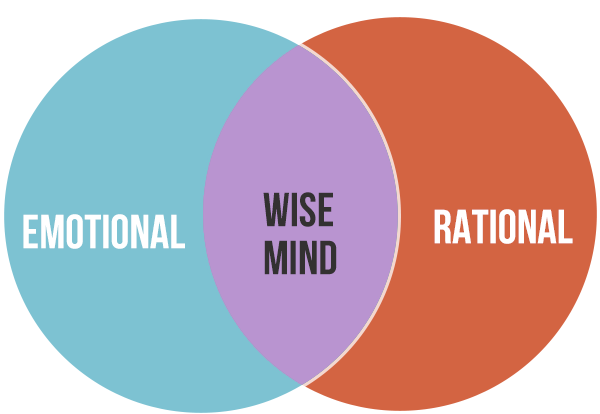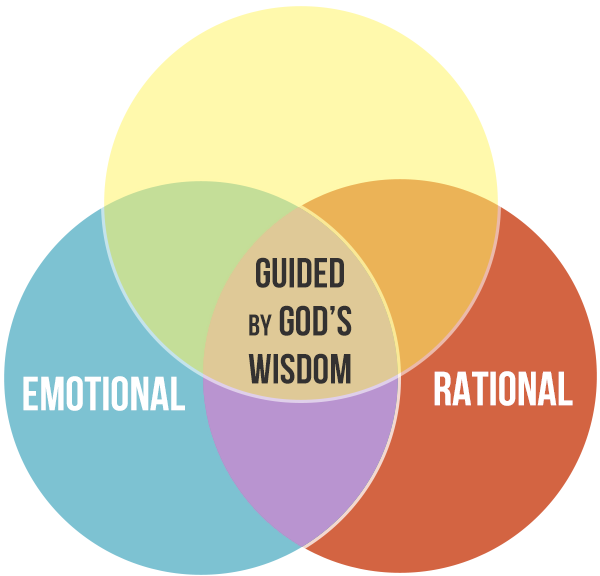Using Proverbs 14:33 and Philippians 3:13-14
For Anxiety (fears, worry, intrusive thoughts)
A basic dialectical approach using Scripture and the wise mind concepts of Dialectical Behavioral Therapy
Proverbs 14:33, NIV
Commentary
Questions
33 Wisdom reposes in the heart of the discerning and even among fools she lets herself be known.
The Dialectical Wise Mind

Where the emotional and rational minds find their proper boundaries.
- With what issue is your mind wrestling?
- What emotions are you feeling as you wrestle with this issue?
- What seems rational to you about this issue?
- How do you balance the emotional and the rational in your mind for this issue?
- What does God’s Word say about this issue?
- How is God’s Word helpful for guiding you in His Wisdom in connection with this issue?
- How does what God’s Word says about this issue make you more discerning?
Philippians 3:13-14, NIV
13 I do not consider myself yet to have taken hold of it. But one thing I do: Forgetting what is behind and straining toward what is ahead,
14 I press on toward the goal to win the prize for which God has called me heavenward in Christ Jesus.
Wisdom reposing in the heart of the discerning

The Wise Mind guided by
God’s Wisdom
God, the Holy Spirit, gives us guidance through His Word to set the boundaries of the emotional and rational mind to form the Wise Mind, guided by God’s Wisdom
- How do these charts help you understand what is true wisdom?
- According to this passage (Proverbs 14:33), where does wisdom repose?
- What will help you become more discerning as you think about this issue?
- St. Paul wrote Philippians 3:13-14. How do you see yourself similar to the way St. Paul describes himself in verse 13?
- How can you do what he did?
- Who is guiding you to your goal?
- Where will you find God’s Wisdom?
EMOTIONAL MIND
- What are you feeling about this situation/problem/issue/ challenge in your life?
- How are your feelings impacting what you are saying and doing or plan to say and do?
- How pleasant are these feelings?
- How positive are these feelings?
- How much do you like these feelings?
RATIONAL MIND
- What is your common sense telling you about this situation/problem/issue/challenge in your life?
- How have you reacted to this situation in the past?
- How have these past reactions worked for you?
- What would your best friend say to you about this situation/problem/issue?
- What would you say to your best friend if they came to you with this situation/problem/issue/ challenge in their life?
GUIDANCE FROM GOD’S WORD
- What does God say in His Word about this situation/problem/issue/ challenge in your life?
- How does God challenge you through His Word?
- How does God comfort you through His Word?
- How does God guide or direct you through His Word?
THE WISE GUIDED BY GOD’S WISDOM
- What are my feelings about this situation/ problem/issue/ challenge in my life guided by God’s Wisdom?
- What are my thoughts guided by God’s Wisdom?
- What are my actions guided by God’s Wisdom?
- What is my prayer to God regarding this situation/problem/issue/ challenge in my life?
- Who do I have in my life that can give me further Christian guidance from God’s Word regarding this situation/problem/issue/ challenge in my life who will keep our discussion confidential?
- How can I be more in contact with God’s Word so that I have more encouragement in connection with His amazing grace?
*From the writings of Rev. Alan Siggelkow. Please cite if including this resource elsewhere. Alan H. Siggelkow with insight from Allison Franck.
The above exercise has greater benefit when working with a Christian therapist, your pastor, or a fellow Christian. Interaction and accountability with another person who can provide understanding and encouragement is reinforced in therapy sessions.
